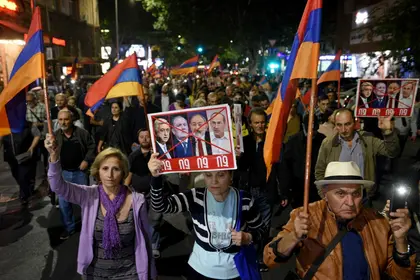Azerbaijan's lightning victory in Nagorno-Karabakh, where Moscow has stationed peacekeepers, shows that Russia's influence is quickly dwindling in a region it has long considered its backyard, analysts say.
Russia, which has been mired in Ukraine since the start of the assault last year, refused to intervene when Azerbaijan seized control of the Armenian-populated region of Karabakh last week.
JOIN US ON TELEGRAM
Follow our coverage of the war on the @Kyivpost_official.
"What happened in Karabakh would have been impossible without a systemic weakening of the Russian state," independent Caucasus expert Gela Vasadze said.
"Russia has no resources to shape the Caucasus affairs any longer."
Over the past three decades Armenia and Azerbaijan have fought two wars over Nagorno-Karabakh, a majority ethnic Armenian enclave within the internationally recognized border of Azerbaijan.
Following a six-week war in 2020 Armenian separatists ceded territory they had controlled for decades in a deal brokered by Russia.
Moscow deployed some 2,000 peacekeepers mandated to ensure the safety of territories remaining under separatist control and prevent any new conflict.
Armenia bitterly accused Russia of failing its mission when Azerbaijan last week launched a new offensive and took over the rest of the territory.
The hostilities that according to the separatists killed some 200 people followed a months-long blockade in Karabakh that Armenia said Russian peacekeepers had also failed to prevent.

Finland PM Says Russia ‘Permanent’ Threat to EU
Azerbaijan's one-day military operation ended on Wednesday with a separatist pledge to disarm and thousands of refugees streaming into Armenia.
Russian peacekeepers "turned out to be powerless in front of one of the parties -- Azerbaijan," said independent Russian analyst Arkady Dubnov.
Armenian Prime Minister Nikol Pashinyan did not mince his words on Sunday, saying a security agreements with Russia had proved "insufficient" and suggesting he would seek new alliances.
Armenia is a member of the Collective Security Treaty Organization (CSTO), a Moscow-led security alliance comprised of six post-Soviet states.
The group pledges to protect other members in case of an attack. "In recent days no one has mentioned the CSTO as if it does not exist," said Dubnov.
"And that's the truth -- it does not," he added, calling the alliance a "suitcase without a handle" – hard to carry around and a shame to abandon.
Moscow insisted that its peacekeepers were not to blame, vowed to ensure the rights of Armenians in Nagorno-Karabakh and said it was maintaining dialogue with Yerevan.
But in a sign of rising tensions, Moscow on Monday accused the Armenian leadership of "running to the West."
"The leadership in Yerevan is making a huge mistake by deliberately trying to destroy Armenia's multifaceted and centuries-old ties with Russia," Russia's foreign ministry said.
This month Armenia and the United States held military drills, in the latest sign of Yerevan drifting from Moscow's orbit.
Russia's assault on Ukraine has spurred other ex-Soviet countries to deepen alliances elsewhere. The leaders of five Central Asian former Soviet countries – Kazakhstan, Kyrgyzstan, Uzbekistan, Turkmenistan, and Tajikistan – met for a summit with Chinese President Xi Jinping in May.
Last week US President Joe Biden met the leaders of the so-called "C5" on the sidelines of the UN General Assembly in New York.
"Russia is losing its influence because it can't offer a vision for the future, being busy with territorial expansion, mythologizing history, and looking for the future in its past," Dubnov told AFP.
"Azerbaijan has taken advantage of the fact that Russia is focused on the conflict with Ukraine," he added. Dubnov argued that Baku and Moscow were following the same logic as they sought to reshape their borders by force.
"The law of the strongest wins, and Moscow is leading by example." Vasadze suggested that Russia would seek to regain ground in Armenia by helping install a new government there.
"Of course, Russia wants to maintain its influence on Armenia, where it lost its main lever – Karabakh," he said.
"It is now focusing on its goal to have a loyal government in Yerevan and Pashinyan is not fit for the role."
You can also highlight the text and press Ctrl + Enter






